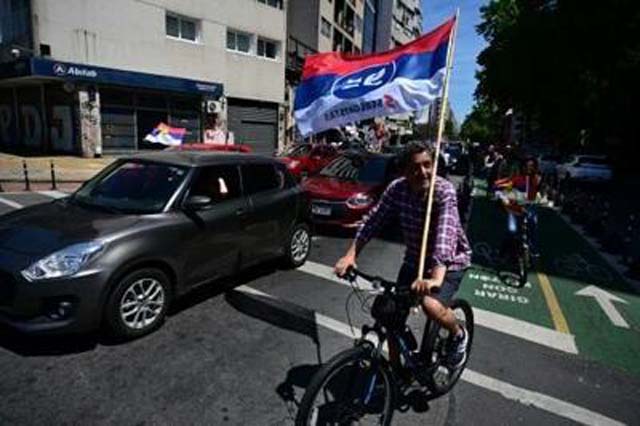
MONTEVIDEO, Oct 25 (NNN-AGENCIES) — Voters in Latin America’s most stable democracy, Uruguay, go to the polls on Sunday in a presidential election pitting a left-wing history teacher against a conservative veterinarian and a
bodybuilding lawyer.
Polls show security topping the concerns of voters in the tiny country of 3.4 million people, wedged between Brazil and Argentina and facing an increase in drug-related violence in recent years.
While the number of reported robberies and incidents of cattle-rustling — Uruguay has more cattle than people — have fallen sharply under outgoing center-right President Luis Lacalle Pou, the murder rate remains high.
The pension system is also a key theme in the campaign.
On the same day as the presidential election, Uruguayans are called on to vote on a controversial proposal from the PIT-CNT union to lower the minimum retirement age from 65 to 60 and to ban private pension schemes.
Analysts have warned that the proposal, which PIT-CNT says would cost $460 million a year but detractors estimate at more than twice that, could further damage the finances of a country still recovering from the Covid-19 pandemic
and a record drought in 2023.
The fiscal deficit stood at 4.4 percent of GDP in August.
The three main presidential candidates have all said they will reject the plebiscite.
Lacalle Pou is barred by the constitution from seeking a second consecutive five-year term.
Polls show history professor Yamandu Orsi, 57, from the center-left Frente Amplio (Broad Front) of cult former president Jose “Pepe” Mujica, leading the race.
They show Alvaro Delgado, a 55-year-old conservative veterinarian from Lacalle Pou’s National Party in second and telegenic lawyer Andres Ojada, 40, of the Colorado Party in third.
If, as expected, no candidate wins Sunday’s vote outright, the top two contenders will go into a runoff round on Nov 24.
Orsi is a protege of the famously humble Mujica.
He was born in the countryside in a house with no electricity and campaigned as a man of the people.
Delgado has sought to woo rural voters by saying he is happier on horseback than in one of Uruguay’s ritzy beach resorts.
But he was mocked as a “caveman” on social media during the campaign for calling his running mate, former trade unionist Valeria Ripoll, a “hottie”.
He later apologized, calling the remark a “mistake.”
Ojeda, a TV legal pundit and bodybuilding fanatic who compares himself to Argentina’s libertarian President Milei, caused a stir by recording a campaign ad in the gym, where he flaunted his toned physique.
The election has generated little excitement in Uruguay, which is one of the richest countries per-capita in Latin America and one of the most liberal.
Most of the campaigning for the presidential and concomitant parliamentary elections has taken place on social media.
Uruguay gained a reputation as a liberal mold-breaker under successive left-wing governments between 2005 and 2020.
The country legalized abortion and same-sex marriage and became the world’s first nation to allow recreational cannabis use.
It has also blazed a trail in the greening of its economy, with over 90 percent of its electricity coming from renewable sources.
But high levels of violent crime in recent years have been a concern for voters.
A second plebiscite held Sunday will ask whether the police should be allowed to carry out nighttime raids on homes in order to crack down on drug trafficking.
Voters are expected to reject the measure. — NNN-AGENCIES
